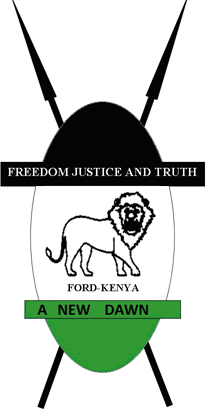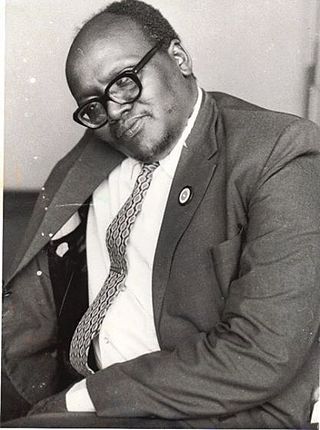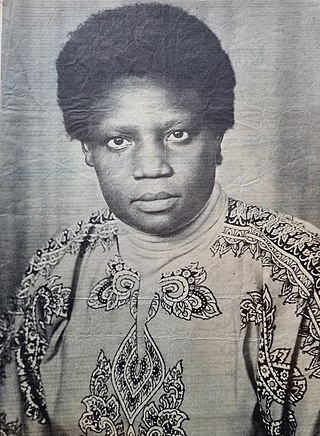
Daniel Toroitich arap Moi was a Kenyan politician who served as the second president of Kenya from 1978 to 2002. He is the country's longest-serving president to date. Moi previously served as the third vice president of Kenya from 1967 to 1978 under President Jomo Kenyatta, becoming the president following the latter's death.

Nakuru is a city in the Rift Valley region of Kenya. It is the capital of Nakuru County, and was formerly the capital of Rift Valley Province. As of 2019, Nakuru had an urban and rural population of 570,674 inhabitants, making it the largest urban centre in the Rift Valley, with Eldoret in Uasin Gishu County following closely behind. The city lies along the Nairobi Nakuru Highway, a distance of 160 kilometers from Nairobi, the capital of Kenya. It is the third largest city and fourth largest urban centre by metropolitan area in Kenya, behind Nairobi, Mombasa and Kisumu respectively. It lies about 1,850 m above sea level.

Forum for the Restoration of Democracy–Kenya (FORD–Kenya) is a Kenyan political party. The party has sat in the government of Kenya once, under the National Rainbow Coalition, from 2003 to 2007, having ended forty years of one party rule. In April 2022, the party joined the Kenya Kwanza coalition for the August 2022 elections, and is headed by Moses Wetangula, the current speaker of the National Assembly of Kenya
James Aggrey Bob Orengo is a Kenyan lawyer, a well known human rights activist and politician who is the current governor for Siaya County. He is also one of the few Kenyan lawyers who have attained the professional grade of Senior counsel in the legal field, a title that he earned under former president Mwai Kibaki.

John Njoroge Michuki was a Kenyan politician and businessman. He was born at Muguru, village, Iyego Location, Kangema Division in Murang’a District. He was educated in Kenya and abroad. Michuki emerged as one of the prominent and long-serving civil servants and politicians as well as a businessman in Kenya. Michuki served Kenya in various capacities, including Permanent Secretary in the Finance Ministry, Chairman of the Kenya Commercial Bank, Member of Parliament and Cabinet Minister. He was serving his 4th five-year term as a Member of Parliament for Kangema Constituency. Michuki had a reputation as a "ruthless" and efficient manager, and was widely acknowledged as among the best performing ministers in President Kibaki's Government. He was serving as the Minister for Environment and National Resources at the time of his death.
Koigi wa Wamwere is a Kenyan politician, human rights activist, journalist and writer. Koigi became famous for opposing both the Jomo Kenyatta and Daniel arap Moi regimes, both of whom sent him to detention.
Mûkûrwe'inî was a former district in Nyeri County, Kenya.
Dr. Josephat Njuguna Karanja was the fifth Vice-President of the Republic of Kenya between 1988 and 1989. He resigned to avoid an ongoing vote-of-no-confidence in the Kenyan Parliament. He was accused by the now late Hon. David Mwenje Member of Parliament for Embakasi Constituency of wanting to overthrow President Daniel arap Moi's government by soliciting help from foreign nations. His large network of friends from the west – mainly US and Britain – where he had been a High Commissioner Ambassador. The speculation was fuelled by his wife being from a foreign country (Uganda). He was accused of displaying the stunning beauty at a time when political wives were never seen nor heard. Few people failed to understand his western ideological thinking.

Charles Mugane Njonjo was a Kenyan lawyer who served as Attorney General of Kenya from 1963 to 1979, and Minister of Constitutional Affairs and the member of Parliament for Kikuyu Constituency from 1980 to 1983.

Martha Wangari Karua is a Kenyan politician. She is a former long-standing member of parliament for Gichugu Constituency and an Advocate of the High Court of Kenya. She was Minister for Justice until resigning from that position in April 2009. She has consistently fought for the protection of women's rights and improvements to the democratic process.
G. G. Njuguna Ngengi was a Kenyan politician native to Molo, Kenya.
Nyeri High School, also known as Nyeri High, is a boys boarding school situated in Nyeri, Kenya near Mathari Consolata Mission Hospital, which provides secondary education as stipulated by the 8-4-4 Curriculum. Despite being acknowledged as an academic giant in the region, the school has also developed a notoriety for student unrest culminating in the death of four school prefects in a fire caused by student arson and followed a few years later by a student strike that led to an official government inquiry into the running of the school.

Jean-Marie Seroney was a Kenyan human rights advocate, a legislator, and an Amnesty International prisoner of conscience. He was detained as a prisoner of conscience for 1,155 days.
The Chama Cha Uzalendo is a Kenyan political party established in 2004. The party is currently headed by Maur Bwanamaka. Former party chairmen include Wavinya Ndeti and Koigi Wamwere.

Nyayo House is a skyscraper in Nairobi, Kenya. It hosts several government departments such as immigration and also serves as the headquarters of Nairobi Province. The building is located at the corner of Uhuru Highway and Kenyatta Avenue. It is 84 metres high and has 27 floors
Lawrence Sifuna Sifuna is a Kenyan politician who was Member of Parliament for Bumula, the first MP of that constituency. He was first elected to the Kenyan Parliament on November 8, 1979 in the then larger Bungoma South constituency. Sifuna was re-elected in 1983 too. He lost to a former North Eastern Provincial Commissioner Maurice Makhanu in the 1988 General Election after Bungoma South constituency was renamed Kanduyi. Sifuna recaptured the seat during the first multi-party General Election of 1992 on a Ford Asili ticket.
Dennis Akumu (1934-2016) was a Kenyan politician, trade unionist and independence freedom fighter. He was the first secretary general of the Organisation of African Trade Union Unity (OATUU).
The Mwakenya Movement was an underground socialist movement in Kenya in the 1980s formed to fight for multi-party democracy.

Philomena Chelagat Mutai(January 29, 1949- July 6, 2013) was a prominent female Kenyan politician and human rights defender known for her bold utterances in and outside the Parliament of Kenya. Popularly known as 'Chelagat Mutai', she started out as a vocal student activist and journalist, later joining elective politics early in her life and becoming a fierce critic of the Kenya government. She became an Amnesty International prisoner of conscience when the administration of President Jomo Kenyatta clamped down on dissent and threw her in jail. She was eventually exiled from Kenya joining a cast of foreign-based Kenyan dissidents fleeing the repressive regimes of Kenyatta and Daniel Moi. In October 1974, at the age of 25, she became the youngest person elected to the Kenyan Parliament, defeating a cast of 11 male contestants in a tight race for the Eldoret North seat. She quickly joined Kenya's leftist politics, becoming a fierce critic of the Kenyatta government, and was imprisoned as a result. Soon after her incarceration, she returned to politics winning back the seat she had lost. She would not last long and would be exiled from Kenya, fleeing what she believed to be another round of politically motivated incarceration. She spent several years in exile in Tanzania. She championed the inclusion of women in Kenyan politics and society, and as a lifelong activist for good governance.








